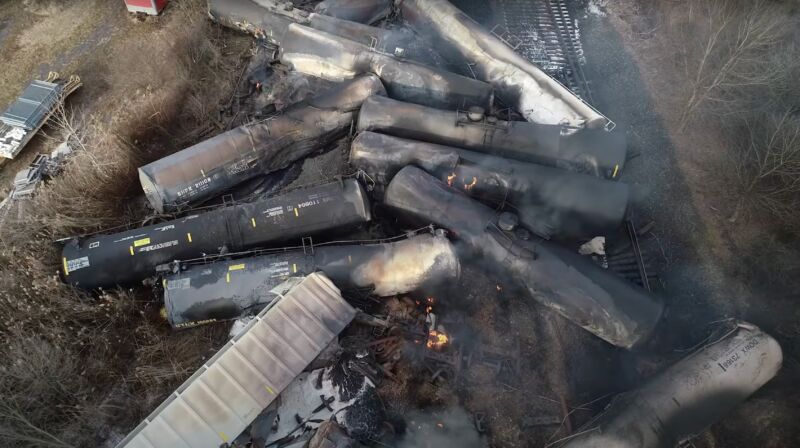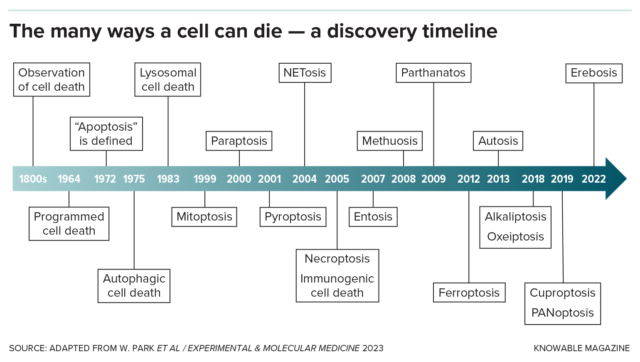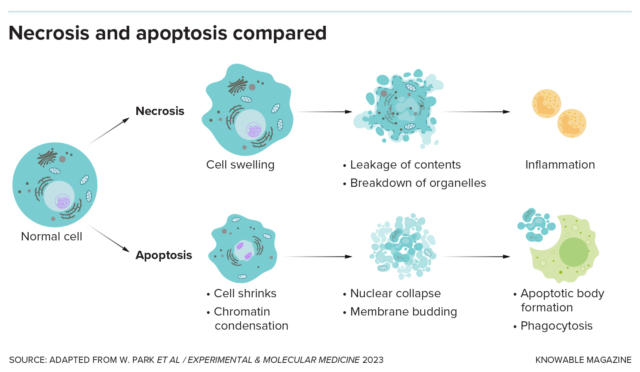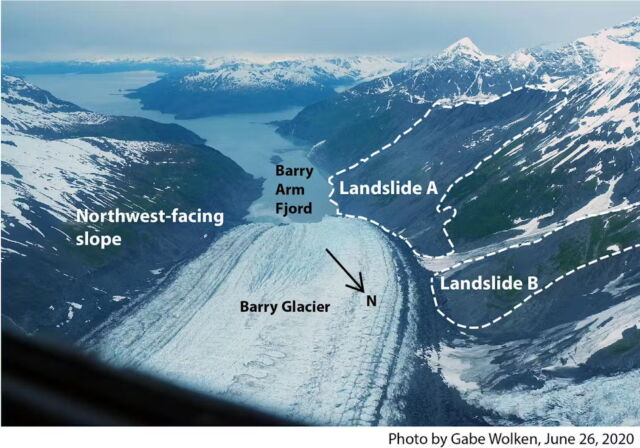Can walls of oysters protect shores against hurricanes? Darpa wants to know.
Colonized artificial reef structures could absorb the power of storms.

Credit: Kemter/Getty Images
On October 10, 2018, Tyndall Air Force Base on the Gulf of Mexico—a pillar of American air superiority—found itself under aerial attack. Hurricane Michael, first spotted as a Category 2 storm off the Florida coast, unexpectedly hulked up to a Category 5. Sustained winds of 155 miles per hour whipped into the base, flinging power poles, flipping F-22s, and totaling more than 200 buildings. The sole saving grace: Despite sitting on a peninsula, Tyndall avoided flood damage. Michael’s 9- to 14-foot storm surge swamped other parts of Florida. Tyndall’s main defense was luck.
That $5 billion disaster at Tyndall was just one of a mounting number of extreme-weather events that convinced the US Department of Defense that it needed new ideas to protect the 1,700 coastal bases it’s responsible for globally. As hurricanes Helene and Milton have just shown, beachfront residents face compounding threats from climate change, and the Pentagon is no exception. Rising oceans are chewing away the shore. Stronger storms are more capable of flooding land.
In response, Tyndall will later this month test a new way to protect shorelines from intensified waves and storm surges: a prototype artificial reef, designed by a team led by Rutgers University scientists. The 50-meter-wide array, made up of three chevron-shaped structures each weighing about 46,000 pounds, can take 70 percent of the oomph out of waves, according to tests. But this isn’t your grandaddy’s seawall. It’s specifically designed to be colonized by oysters, some of nature’s most effective wave-killers.
If researchers can optimize these creatures to work in tandem with new artificial structures placed at sea, they believe the resulting barriers can take 90 percent of the energy out of waves. David Bushek, who directs the Haskin Shellfish Research Laboratory at Rutgers, swears he’s not hoping for a megastorm to come and show what his team’s unit is made of. But he’s not not hoping for one. “Models are always imperfect. They’re always a replica of something,” he says. “They’re not the real thing.”
Playing defense Reefense
The project is one of three being developed under a $67.6 million program launched by the US government’s Defense Advanced Research Projects Agency, or Darpa. Cheekily called Reefense, the initiative is the Pentagon’s effort to test if “hybrid” reefs, combining manmade structures with oysters or corals, can perform as well as a good ol’ seawall. Darpa chose three research teams, all led by US universities, in 2022. After two years of intensive research and development, their prototypes are starting to go into the water, with Rutgers’ first up.
Today, the Pentagon protects its coastal assets much as civilians do: by hardening them. Common approaches involve armoring the shore with retaining walls or arranging heavy objects, like rocks or concrete blocks, in long rows. But hardscape structures come with tradeoffs. They deflect rather than absorb wave energy, so protecting one’s own shoreline means exposing someone else’s. They’re also static: As sea levels rise and storms get stronger, it’s getting easier for water to surmount these structures. This wears them down faster and demands constant, expensive repairs.
In recent decades, a new idea has emerged: using nature as infrastructure. Restoring coastal habitats like marshes and mangroves, it turns out, helps hold off waves and storms. “Instead of armoring, you’re using nature’s natural capacity to absorb wave energy,” says Donna Marie Bilkovic, a professor at the Virginia Institute for Marine Science. Darpa is particularly interested in two creatures whose numbers have been decimated by humans but which are terrific wave-breakers when allowed to thrive: oysters and corals.
Oysters are effective wave-killers because of how they grow. The bivalves pile onto each other in large, sturdy mounds. The resulting structure, unlike a smooth seawall, is replete with nooks, crannies, and convolutions. When a wave strikes, its energy gets diffused into these gaps, and further spent on the jagged, complex surfaces of the oysters. Also unlike a seawall, an oyster wall can grow. Oysters have been shown to be capable of building vertically at a rate that matches sea-level rise—which suggests they’ll retain some protective value against higher tides and stronger storms.
Today hundreds of human-tended oyster reefs, particularly on America’s Atlantic coast, use these principles to protect the shore. They take diverse approaches; some look much like natural reefs, while others have an artificial component. Some cultivate oysters for food, with coastal protection a nice co-benefit; others are built specifically to preserve shorelines. What’s missing amid all this experimentation, says Bilkovic, is systematic performance data—the kind that could validate which approaches are most effective and cost-effective. “Right now the innovation is outpacing the science,” she says. “We need to have some type of systematic monitoring of projects, so we can better understand where the techniques work the best. There just isn’t funding, frankly.”
Hybrid deployments
Rather than wait for the data needed to engineer the perfect reef, Darpa wants to rapidly innovate them through a burst of R&D. Reefense has given awardees five years to deploy hybrid reefs that take up to 90 percent of the energy out of waves, without costing significantly more than traditional solutions. The manmade component should block waves immediately. But it should be quickly enhanced by organisms that build, in months or years, a living structure that would take nature decades.
The Rutgers team has built its prototype out of 788 interlocked concrete modules, each 2 feet wide and ranging in height from 1 to 2 feet tall. They have a scalloped appearance, with shelves jutting in all directions. Internally, all these shelves are connected by holes.
A Darpa-funded team will install sea barriers, made of hundreds of concrete modules, near a Florida military base. The scalloped shape should not only dissipate wave energy but invite oysters to build their own structures.
What this means is that when a wave strikes this structure, it smashes into the internal geometry, swirls around, and exits with less energy. This effect alone weakens the wave by 70 percent, according to the US Army Corps of Engineers, which tested a scale model in a wave simulator in Mississippi. But the effect should only improve as oysters colonize the structure. Bushek and his team have tried to design the shelves with the right hardness, texture, and shading to entice them.
But the reef’s value would be diminished if, say, disease were to wipe the mollusks out. This is why Darpa has tasked Rutgers with also engineering oysters resistant to dermo, a protozoan that’s dogged Atlantic oysters for decades. Darpa prohibited them using genetic-modification techniques. But thanks to recent advances in genomics, the Rutgers team can rapidly identify individual oysters with disease-resistant traits. It exposes these oysters to dermo in a lab, and crossbreeds the survivors, producing hardier mollusks. Traditionally it takes about three years to breed a generation of oysters for better disease resistance; Bushek says his team has done it in one.
The tropics are a different story
Oysters may suit the DoD’s needs in temperate waters, but for bases in tropical climates, it’s coral that builds the best seawalls. Hawaii, for instance, enjoys the protection of “fringing” coral reefs that extend offshore for hundreds of yards in a gentle slope along the seabed. The colossal, complex, and porous character of this surface exhausts wave energy over long distances, says Ben Jones, an oceanographer for the Applied Research Laboratory at the University of Hawaii—and head of the university’s Reefense project. He said it’s not unusual to see ocean swells of 6 to 8 feet way offshore, while the water at the seashore laps gently.
A Marine base in Hawaii will test out a new approach to coastal protection inspired by local coral reefs: A forward barrier will take the first blows of the waves, and a scattering of pyramids will further weaken waves before they get to shore.
Inspired by this effect, Jones and a team of researchers are designing an array that they’ll deploy near a US Marine Corps base in Oahu whose shoreline is rapidly receding. While the final design isn’t set yet, the broad strokes are: It will feature two 50-meter-wide barriers laid in rows, backed by 20 pyramid-like obstacles. All of these are hollow, thin-walled structures with sloping profiles and lots of big holes. Waves that crash into them will lose energy by crawling up the sides, but two design aspects of the structure—the width of the holes and the thinness of the walls—will generate turbulence in the water, causing it to spin off more energy as heat.
The manmade structures in Hawaii will be studded with concrete domes meant to encourage coral colonization. Though at grave risk from global warming, coral reefs are thought to provide coastal-protection benefits worth billions of dollars.
In the team’s full vision, the units are bolstered by about a thousand small coral colonies. Jones’ group plans to cover the structures with concrete modules that are about 20 inches in diameter. These have grooves and crevices that offer perfect shelters for coral larvae. The team will initially implant them with lab-bred coral. But they’re also experimenting with enticements, like light and sound, that help attract coral larvae from the wild—the better to build a wall that nature, not the Pentagon, will tend.
A third Reefense team, led by scientists at the University of Miami, takes its inspiration from a different sort of coral. Its design has a three-tiered structure. The foundation is made of long, hexagonal logs punctured with large holes; atop it is a dense layer with smaller holes—“imagine a sponge made of concrete,” says Andrew Baker, director of the university’s Coral Reef Futures Lab and the Reefense team lead.
The team thinks these artificial components will soak up plenty of wave energy—but it’s a crest of elkhorn coral at the top that will finish the job. Native to Florida, the Bahamas, and the Caribbean, elkhorn like to build dense reefs in shallow-water areas with high-intensity waves. They don’t mind getting whacked by water because it helps them harvest food; this whacking keeps wave energy from getting to shore.
Disease has ravaged Florida’s elkhorn populations in recent decades, and now ocean heat waves are dealing further damage. But their critical condition has also motivated policymakers to pursue options to save this iconic state species—including Baker’s, which is to develop an elkhorn more rugged against disease, higher temperatures, and nastier waves. Under Reefense, Baker says, his lab has developed elkhorn with 1.5° to 2° Celsius more heat tolerance than their ancestors. They also claim to have boosted the heat thresholds of symbiotic algae—an existentially important occupant of any healthy reef—and cross-bred local elkhorn with those from Honduras, where reefs have mysteriously withstood scorching waters.
An unexpected permitting issue, though, will force the Miami team to exit Reefense in 2025, without building the test unit it hoped to deploy near a Florida naval base. The federal permitting authority wanted a pot of money set aside to uninstall the structure if needed; Darpa felt it couldn’t do that in a timely way, according to Baker. (Darpa told WIRED every Reefense project has unique permitting challenges, so the Miami team’s fate doesn’t necessarily speak to anything broader. Representatives for the other two Reefense projects said Baker’s issue hasn’t come up for them.)
Though his team’s work with Reefense is coming to a premature end, Baker says, he’s confident their innovations will get deployed elsewhere. He’s been working with Key Biscayne, an island village near Miami whose shorelines have been chewed up by storms. Roland Samimy, the village’s chief resilience and sustainability officer, says they spend millions of dollars every few years importing sand for their rapidly receding beaches. He’s eager to see if a hybrid structure, like the University of Miami design, could offer protection at far lower cost. “People are realizing their manmade structures aren’t as resilient as nature is,” he says.
Not just Darpa
By no means is Darpa the only one experimenting in these areas. Around the world, there are efforts tackling various pieces of the puzzle, like breeding coral for greater heat resistance, or combining coral and oysters with artificial reefs, or designing low-carbon concrete that makes building these structures less environmentally damaging. Bilkovic, of the Virginia Institute for Marine Science, says Reefense will be a success if it demonstrates better ways of doing things than the prevailing methods—and has the data to back this up. “I’m looking forward to seeing what their findings are,” she says. “They’re systematically assessing the effectiveness of the project. Those lessons learned can be translated to other areas, and if the techniques are effective and work well, they can easily be translated to other regions.”
As for Darpa, though the Reefense prototypes are just starting to go in the water, the work is just beginning. All of these first-generation units will be scrutinized—both by the research teams and independent government auditors—to see whether their real-world performance matches what was in the models. Reefense is scheduled to conclude with a final report to the DoD in 2027. It won’t have a “winner” per se; as the Pentagon has bases around the world, it’s likely these three projects will all produce learnings that are relevant elsewhere.
Although their client has the largest military budget in the world, the three Reefense teams have been asked to keep an eye on the economics. Darpa has asked that project costs “not greatly exceed” those of conventional solutions, and tasked government monitors with checking the teams’ math. Catherine Campbell, Reefense’s program manager at Darpa, says affordability doesn’t just make it more likely the Pentagon will employ the technology—but that civilians can, too.
“This isn’t something bespoke for the military… we need to be in line with those kinds of cost metrics [in the civilian sector],” Campbell said in an email. “And that gives it potential for commercialization.”
This story originally appeared on wired.com.
Can walls of oysters protect shores against hurricanes? Darpa wants to know. Read More »

































